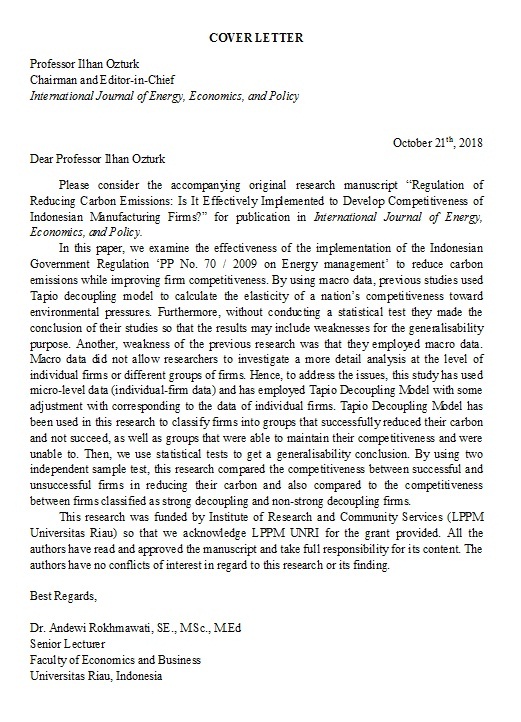Regulation of Reducing Carbon Emissions: Is It Effectively Implemented to Develop Competitiveness of Indonesian Manufacturing Firms?
Abstract
This research aims to examine the effectiveness of the implementation of the Indonesian Government Regulation ‘PP No. 70 / 2009 on Energy management' to reduce carbon emissions while improving firm competitiveness. This study involved 645 manufacturing firms with the consumed the energy of more than 6,000 ton equivalent oil. To measure the effectiveness of the regulation implementation, this research used a decoupling concept of elasticity developed by Tapio to classify firms into groups that successfully reduced their carbon and not succeed, as well as groups that were able to maintain their competitiveness and were unable to. Then by using two independent sample test, this research compared the competitiveness between successful and unsuccessful firms in reducing their carbon, and also compared to the competitiveness between firms classified as strong decoupling and non-strong decoupling firms. The result of this study shows the successful firms reducing carbon emission have higher competitiveness than those who are unsuccessful. Secondly, Strong decoupling firms have higher competitiveness than those non-strong decoupling. The regulation appears to begin having an effect on firms' carbon costs after the five-year implementation.Keywords: Carbon Emissions, Firm Competitiveness, Tapio DecouplingJEL Classifications: G3, L6, M1, Q5DOI: https://doi.org/10.32479/ijeep.7076
Downloads
Published
2018-10-28
How to Cite
Rokhmawati, A., Weniagustin, N., Fitri, F., Haryetti, H., & Yafiz, I. A. (2018). Regulation of Reducing Carbon Emissions: Is It Effectively Implemented to Develop Competitiveness of Indonesian Manufacturing Firms?. International Journal of Energy Economics and Policy, 8(6), 258–266. Retrieved from https://www.econjournals.com/index.php/ijeep/article/view/7076
Issue
Section
Articles




